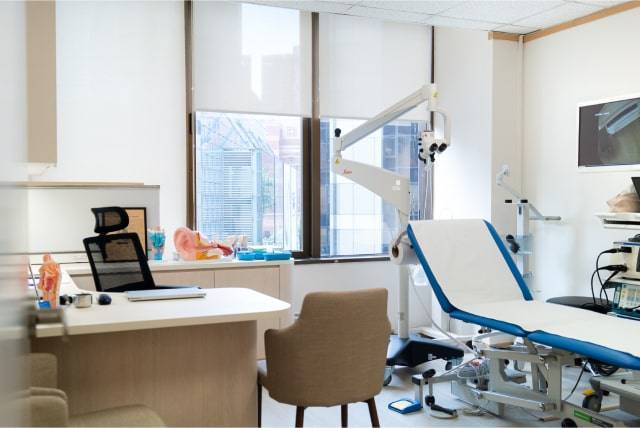Individuals who are suffering from sinusitis may be familiar with the potentially debilitating symptoms that interfere not only with their physical health but also with their mental well-being. While patients with sinusitis often experience nasal congestion accompanied by facial tenderness, it is less recognised that frequent and prolonged episodes of sinus inflammation can cause a dampened mood due to persistent symptoms. Patients with sinusitis may also struggle to get a good night’s rest because they are unable to breathe comfortably through their nose.
While those who suffer from persistent sinus infections might feel frustrated by their condition, having sinusitis should not prevent individuals from enjoying their lives. Gaining insight into the types of sinusitis can empower individuals to manage their condition effectively. Moreover, understanding that chronic sinusitis is a largely treatable and manageable condition in Singapore can reassure most patients. In this guide, Dr Ker Liang, an experienced ear, nose, and throat (ENT) surgeon and sinus specialist in Singapore, discusses the treatment options available for patients with chronic sinusitis.
Understanding Sinusitis

Sinusitis refers to a condition in which the sinus tissues (cavities in the head, nose, and cheek areas that are usually filled with air) become inflamed. Each person has four pairs of sinuses: frontal, ethmoid, sphenoid, and maxillary. Sinusitis has the possibility of affecting either of them, and this condition is also known as rhinosinusitis.
The sinuses create mucus, which helps flush out bacteria, allergens, and other foreign particles from the nasal passage through the nose. When the sinuses become inflamed, they produce excessive and thick mucus. The mucus from sinusitis tends to be much thicker than normal mucus and is yellow or green in colour. Due to the trapped mucus it makes it hard for patients to breathe through the nose. As there are different types of sinus, patients may feel pain around the area of the forehead (frontal sinus), cheeks (maxillary sinus), or nose (ethmoid and sphenoid sinus) due to the pressure of the trapped mucus.
In Singapore, sinusitis is a common condition affecting children and adults. Due to the tropical weather in Singapore, the prevalence of sinusitis may increase during particular periods of the year. There are different types of sinusitis, and the symptoms can range from mild to severe. Some cases of sinusitis might even be resolved within a few days or weeks without any intervention. In the case of persistent sinusitis, you will need to consult a sinus specialist to receive a proper diagnosis and medical treatment. In Singapore, common treatment options for sinusitis include medications or surgical procedures.
Types of Sinusitis
Acute Sinusitis
Often, acute sinusitis can resolve on its own with adequate rest and self-care. Viral cases typically last around 7 to 10 days, while more serious cases, such as bacterial infections, generally do not last more than four weeks and can be managed with over-the-counter medications. The symptoms are usually similar to the common cold; hence, patients may not be aware of their sinusitis from the get-go.
Recurrent Sinusitis
In some patients, sinusitis may come and go throughout the year. If you experience sinusitis at least four times in one year, and each episode lasts less than two weeks, it is a sign of recurrent sinusitis.
If a patient has growths within their nasal cavity (i.e., nasal polyps), they may be at risk of recurrent sinusitis.
Chronic Sinusitis
Chronic sinusitis is the most common type of sinusitis in Singapore. Affected individuals often experience symptoms for more than 12 weeks. Given its prolonged nature, most patients seek medical advice to alleviate their condition. If you are looking for a solution for your persistent cold-like symptoms, you may need to visit an ENT specialist to get your sinuses checked.
Causes of Chronic Sinusitis
In Singapore, chronic sinusitis can be triggered by various causes, such as:
- Pathogens: Various pathogens (viruses, bacteria, and fungi) are able to infect the sinuses. Once infected, an inflammatory response can be induced. Fungal infections can potentially cause serious symptoms, especially in individuals with weakened immune systems.
- Allergens: Allergens like dust mites, mould spores, and pet dander can trigger sinusitis symptoms, leading to nasal congestion and irritation. Since Singapore has a humid climate, these allergens are commonly found, making it harder to avoid exposure.
- Singapore’s Environment: Aside from Singapore’s humid climate, other environmental factors due to the urban surroundings, such as occasional haze and air pollution, can trigger sinusitis.
- Nasal Conditions: Abnormal nasal structures such as deviated septum and nasal polyps may block airflow, which can increase the risk of sinus infections and inflammation by trapping mucus inside the nose.
Symptoms of Chronic Sinusitis

A strong indicator that an individual is experiencing chronic sinusitis is when their “cold-like” symptoms persist for 12 weeks or more. The most common sign is nasal congestion due to trapped mucus, which hinders patients’ ability to breathe normally. At the same time, the mucus exerts pressure on the sinus cavities. In many patients, this pressure translates into palpable tenderness around the eyes, forehead and cheeks.
Patients with chronic sinusitis may also produce thick mucus that is yellow or green in colour. The production of this mucus may lead to postnasal drip, where mucus leaks down to the back of the throat, which could then lead to a cough. It is also common for patients to experience a reduced sense of smell and taste, which interferes with simple daily activities such as eating.
In addition, some patients may also experience sinus headaches. This is due to the increased pressure within the nasal passages. Sinus pressure ear pain is another common symptom that patients may experience concurrently with sinus headaches.
Chronic sinusitis fatigue and restlessness are also common in patients. These symptoms are often caused and worsened by sleep disturbances due to breathing difficulties. Other symptoms that patients might deal with include coughing, bad breath, and nausea.
The severity of symptoms may vary in different individuals. For most patients, dealing with persistent symptoms for several weeks to months can be challenging. To overcome these problems, patients are encouraged to visit a sinus specialist for proper treatment and management of their sinusitis.
Who is More Prone to Developing Chronic Sinusitis?

Individuals with pre-existing nasal conditions face higher chances of developing chronic sinusitis, including:
- Nasal Allergies: Prolonged exposure to particles that might induce allergic responses, like dust mites, mould spores, and pet dander. As a result, the symptoms of rhinitis may further exacerbate sinusitis symptoms.
- Asthma: Patients with asthma are more likely to experience inflamed airways, especially during an asthma attack. Asthma may also cause increased sensitivity in the airways to infections, allergens, and irritants.
- Nasal Polyps: Nasal polyps can obstruct airflow inside the nasal passage, leading to irritation and inflammation of the sinus tissues.
- Deviated Septum: The bone structure that separates the nostrils may be slanted to one side. This condition can block airflow, thus increasing the chances of inflammation within the affected airway.
- Weakened Immune System: Individuals with a weakened immune system may be more prone to sinus infections. This happens due to the body’s compromised ability to fight pathogens that can infect the sinuses.
- Smoking: Smoking introduces irritants to the nasal passages, which increases the risk of inflammation and sinus infections.
If you have an existing nasal condition and are worried about the risk of chronic sinusitis, consulting a sinus specialist in Singapore is strongly advised. Proper management of underlying nasal conditions can help reduce the risk of sinusitis.
What Happens if Chronic Sinusitis Goes Untreated?

If chronic sinusitis is not treated by any means of medical intervention, severe complications might occur. With chronic inflamed sinuses, the nasal passages may eventually develop structural changes like thickened mucus linings or nasal polyps. These structural changes can further obstruct airflow and drainage. Over time, these conditions may cause a reduced sense of smell (hyposmia) or even complete loss of smell (anosmia).
In extreme cases, sinus infections are able to spread into surrounding tissues, such as the eyes (orbital cellulitis). This condition is known to cause eyesight problems and swelling. Aside from tissues around the eye area, sinus infections may also spread to the brain. This infection is also known as meningitis, and it may cause an abscess to be present in the brain. Chronic sinusitis may also cause blood clots in the sinuses, called sinus thrombosis. This condition may lead to stroke or pulmonary embolism. Although the occurrence of such problems is rare, they are serious health complications and potentially life-threatening. Hence, do not leave your sinusitis untreated, especially if you have been experiencing lasting discomfort.
Chronic sinusitis can also worsen pre-existing medical conditions, such as inferior turbinate hypertrophy (ITH). ITH occurs when the inferior nasal turbinates become enlarged due to chronic inflammation. Chronic sinusitis and ITH share a similar mechanism of the inflammation process, where both cause mucosal linings to thicken. These conditions could potentially increase nasal obstruction, making it harder for patients to breathe comfortably through their nose.
Are Antibiotics and Decongestants Effective in Treating Chronic Sinusitis?
Antibiotics are commonly prescribed for sinus infections. However, their effectiveness in treating chronic sinusitis is limited. Most of the time, chronic sinusitis has underlying causes, like allergies or structural abnormalities, on top of infections. Antibiotics might be beneficial when bacterial infections are present.
Decongestants may provide temporary relief by reducing nasal swelling and improving airflow. However, decongestants do not address the root causes of chronic sinusitis. Using topical decongestants for an extensive period of time may lead to rebound congestion (rhinitis medicamentosa). For long-term management of nasal congestion, it is recommended to irrigate the nasal passages with saline solution or spray the affected areas with corticosteroids.
Surgical Treatment Options Available for Chronic Sinusitis
When antibiotics fail to manage persistent chronic sinusitis issues, a sinus specialist may turn to surgical interventions as a solution.
There are several options for sinus surgery in Singapore, including Balloon Sinuplasty and Functional Endoscopic Sinus Surgery (FESS). These surgical procedures can help patients clear mucus buildup and reopen blocked nasal pathways, making breathing easier.
Balloon Sinuplasty
The main issue for most patients with chronic sinusitis is the build-up of mucus, which causes nasal congestion and facial pain. Due to the density and location of the mucus, patients cannot remove it by blowing their nose like they would with a common cold. An available drainage option is balloon sinuplasty, which is designed to help patients restore proper drainage and relieve other ongoing symptoms of sinusitis.
This procedure begins with inserting a balloon attached to a catheter into the affected passage through the nostril. The catheter will then be carefully positioned by the ENT surgeon, and the balloon will then be inflated. Once the balloon has been inflated, the sinus passage will widen. As a result, the trapped mucus can be removed with ease. This procedure is minimally invasive, and it does not require any incisions to be made. It also does not involve the removal of bones or tissues. Thus, the risk of bleeding and other complications can be minimised.
When eligible, patients can opt to have this procedure done. It is typically performed within 15 to 30 minutes under local anaesthesia. With minimal discomfort and short downtime, this procedure is an ideal treatment for patients with mild to moderate sinusitis symptoms.
Functional Endoscopic Sinus Surgery
An alternative surgery for patients with chronic sinusitis is functional endoscopic sinus surgery (FESS). This procedure focuses on removing blockages within the sinus passages that result in inflammation of the tissue linings. These blockages include any kind of obstruction including nasal polyps, swollen mucosal tissue, structural abnormalities and more. Once these obstructions are cleared, FESS helps to restore normal sinus drainage and ventilation, reducing inflammation and preventing recurrent infections.
The procedure begins when the ENT surgeon inserts an endoscope to identify obstructions inside the nose. The FESS procedure is done under general anaesthesia, meaning patients will be asleep throughout the procedure. Although the surgery may require some downtime, the procedure itself is safe and effective. After the surgery, patients may experience discomfort, such as nasal congestion and mild bleeding. A full recovery can be expected after a couple of weeks, during which patients may need to follow post-operative care instructions.
Patients who have not seen improvements after initial treatment for their sinusitis should consider FESS as a chronic sinusitis treatment option with their ENT specialist.
Choosing the Right Surgical Option
In terms of effectiveness, both balloon sinuplasty and FESS have been shown to alleviate patients’ symptoms in Singapore. Most patients are likely unsure or confused when it comes to choosing the right treatment procedure for their condition. In such cases, consulting with an ENT surgeon will help patients gain clearer insight into their condition and which procedure fits their concerns best. In Singapore, you can schedule a consultation with Dr Ker Liang at Aglow ENT Centre for personalised treatment for chronic sinusitis.
Before deciding on a surgery for your condition, Dr Ker Liang, will assess the severity of your condition, identify the underlying cause, and check your overall health status. For patients with mild to moderate sinusitis, balloon sinuplasty is often recommended. Meanwhile, FESS is usually more suitable for patients with more complex cases of sinusitis.
Regardless, consulting with an ear, nose, and throat (ENT) specialist is an essential first step in determining the most appropriate treatment option for you. Assessing additional factors such as the frequency of sinus infections, the presence of nasal polyps, and overall nasal anatomy can help your ENT specialist recommend an optimal course of action to improve sinus health and potentially enhance your quality of life.
Common Misconceptions About Sinus Surgery
Although surgical procedures offer long-term benefits for patients, some might still hesitate to undergo surgery because of common misconceptions. An example of a widespread myth is that sinus surgery is extremely painful. In reality, modern techniques are incorporated by ENT surgeons to minimise discomfort. Most patients only experience mild pain, which can be managed with over-the-counter pain relievers.
Another common misconception is that surgery should only be used as a last resort for treating sinusitis. While it is often true that surgery is usually suggested when medications fail to provide relief, surgery can also be the direct answer for patients who are looking to treat more complex cases of sinusitis. This case usually involves structural abnormalities that can only be treated through surgical methods.
Recovery timelines may also deter patients from considering surgery. However, most individuals who undergo the procedure find themselves returning to their daily activities within a few days, with only mild congestion and swelling that progressively improves.
While surgical fears are understandable, the landscape of modern sinus procedures offers reassurance. These surgeries, demonstrated by skilled ENT surgeons, show low complication rates and a strong safety profile. However, no surgery is entirely risk-free, although the potential for significant relief from chronic sinusitis makes surgical intervention a worthwhile consideration.
Consult Dr Ker Liang, an Experienced Sinus Specialist in Singapore for Chronic Sinusitis
If you suffer from chronic sinusitis that might be disrupting your quality of life, you can schedule an appointment with Dr Ker Liang, an experienced sinus specialist in Singapore and ENT Head and Neck Surgeon at Aglow ENT Centre, for a routine checkup and specialised treatment for chronic sinusitis.
Dr Ker Liang has more than 14 years of experience in the field of Otolaryngology. She has undergone specialised postgraduate training from prestigious universities, such as NUS Graduate Medical School. In particular, she has acquired expert knowledge and skills in endoscopic sinus surgery from her rigorous training courses at Singapore’s National University Hospital (NUH). Her surgical skills have empowered numerous sinus patients, enabling them to recover well.
Aglow ENT Centre Offers Same-Day Appointment Bookings For Your Convenience
Aglow ENT Centre is conveniently located in Singapore’s Mount Elizabeth Hospital (Orchard), and patients can schedule same-day appointments.
References
- Cleveland Clinic. Acute Sinusitis. Cleveland Clinic. Published August 25, 2023. Accessed March 25, 2025. https://my.clevelandclinic.org/health/diseases/15285-acute-sinusitis.
- Cleveland Clinic. Sinusitis. Cleveland Clinic. Published September 20, 2023. Accessed March 25, 2025. https://my.clevelandclinic.org/health/diseases/17701-sinusitis.
- Medtronic. Sinus Infections. Medtronic. Accessed March 25, 2025. https://www.medtronic.com/sg-en/patients/conditions/sinus-infections.html.
- HealthHub. Chronic Sinusitis. HealthHub Singapore. Accessed March 25, 2025. https://www.healthhub.sg/a-z/diseases-and-conditions/chronic_sinusitis_ttsh.






